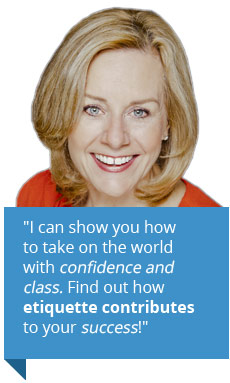The 10 Commandments of E-Mail Etiquette
May 22, 2011
In today’s hurried culture, e-mail can seem like a quick way to communicate your message, but if you don’t take the time to follow the basics, you might end up shooting yourself in the foot (in a business sense, of course). One misconstrued message, sent via iPhone while running from one meeting to another could affect a business relationship.
Here a few reminders to help you keep your digital communication etiquette in check:
- Thou shall use e-mail to convey only ideas and factual or logistical information, not emotions. To express emotions and sentiment, take time for a one-on-one meeting or telephone conversation rather than sending an e-mail. The sound, tone, timber, and quality of your voice will help to better communicate your message and avoid misunderstandings.
- Thou shall write the topic of your message on the reference or subject line. Always write a succinct, accurate description of what recipients can expect in the body of your e- mail in the subject line. It helps them prioritize their messages and quickly sort them for future reference. It also allows them to easily follow the trail of responses back and forth. If you correspond with the same people on multiple subjects, separate the e- mails by the appropriate topic clearly stated in the reference line.
- Thou shall address the e-mail using the name of the intended person. Have you ever received a personal e-mail note destined for someone else? I did—and it was a love note that made me blush! I read half of it and realized it wasn’t meant for me. Since then, I’m never sure I’m the intended recipient unless I see my name at the top.
Don’t muddy your messages; always address the recipient by name.
- Thou shall use “blind copy” for e-mails sent to groups. Avoid sharing names of the whole group via e-mail unless it’s a small, closed group such as a Board of Directors or a Club and you know members have previously been given the list of names and e-mail addresses. E-mail addresses should be kept private.
- Thou shall never ever forward a chain letter that states if you do or don’t do something within a certain time, your life will forever be changed. It’s nice to create change for someone but not by using threats. If you really must send the letter to others, remove the threatening language. If you don’t, you will be excommunicated from the hall of good manners.
- Thou shall use “delivery receipt notification” only when it’s imperative that you know if the intended recipient received it. Don’t create a need to send any unnecessary e-mail by using this tool. It can annoy people.
- Thou shall use capitalization, upper and lower case, and proper punctuation in e-mails as in all other written communications. Studies have proven that if people read text written in all capital or all lower case letters, it takes much longer to read and understand a message. Use a standard way of writing.
- Thou shall close your e-mail message with heartfelt words that show that the sender is fully present. Don’t just rely on your automated signature line to close your e-mail. Let your recipients know that, indeed, a real person is sending them a message.
- Thou shall proofread your e-mail messages before sending them. Although e-mail can be an informal way to communicate with people, it’s always a good habit to use spell-check and read through your note before hitting “send” so that the message is clear. Sometimes just one missing word can make a difference. “I love your work,” and “I loathe your work,” clearly mean two very different things.
- Thou shall respond to e-mails within 24 hours. Even if you cannot yet provide an answer, replying to someone’s e-mail within a day lets the sender knows you received it. Sending immediate responses also keeps you organized and up to date on your e- mail correspondence.
Do you have an e-mail etiquette tips you’d like to share?
 Print This Post
Print This Post
Leave a Reply




2 Trackbacks/Pingbacks
6 Responses to The 10 Commandments of E-Mail Etiquette
Thank you for the wonderful list. i worte a top 10 list of for email etiquette, and I like your quite a bit! Congratulations on a job well done. Sharon
I am so glad you enjoyed it!
This list is just wonderful. As technology changes our world at a rapid pace (one that we sometimes find it hard to keep up with), we must all be reminded that business communication should remain formal. While we may send our family members or friends informal messages – business emails should follow specific guidelines.
I particularly like your tip: “Thou shall use e-mail to convey only ideas and factual or logistical information, not emotions.” It is very important to keep written communication professional and free of emotion. Often, I find that one’s tone can be misunderstood if he or she tries to convey a feeling or emotion to me over email.
Thank you for addressing this topic! It is one that we, as professionals, face every day. Your tips will surely be helpful to me in the future.
Sincerely,
Juanita Ecker
Thank you Juanita! We do work at such a fast pace now — especially with the latest tools at our fingertips to make it so much easier — but business etiquette is no less important. I think it’s even more important today than ever–if you want to stand out from your competition.
Thanks for dropping by the blog!
how about adding another rule:
don’t forward emails without asking the originator
This is great information! Email etiquette is increasingly important as technology and society favors shorter and more immediate forms of communication. I especially enjoyed your unique presentation of having bold and numbered paragraphs, which attracted me to continue reading. I found the useful tips clear and concise as well as written in a vey engaging tone. I also enjoyed the quick paragraph that described what is to come in the beginning of the blog, which helped me decide this was a worthwhile blog to read. Thanks for sharing!